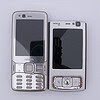Guest panelists were Elliot Soloway , professor, School of Information, School of Education, and Department of Electrical Engineering and Computer Science, University of Michigan; Cathleen Norris , regents professor in the College of Information, Department of Learning Technologies, University of North Texas; Liz Kolb , education technology instructor, University of Michigan and Madonna University, author, Toys to Tools: Connecting Student Cell Phones to Education; and Ron Myers, principal, Trinity Meadows Intermediate School, Keller, Texas.

Mr. Myers described a pilot project that took place in his school. He talked about why the project was iniatiated; how the project was conceived, planned, and conducted; and the outcomes.
 Ms. Kolb spoke about the practical uses of basic cellphones in the classroom. She gave examples of podcasting, photo posting, and mobile blogging and included suggestions for online tools for each type of use. For more from Ms. Kolb see her presentation during K-12 Online Conference 2007 .
Ms. Kolb spoke about the practical uses of basic cellphones in the classroom. She gave examples of podcasting, photo posting, and mobile blogging and included suggestions for online tools for each type of use. For more from Ms. Kolb see her presentation during K-12 Online Conference 2007 .- The Cell Phones ON wiki I discovered while browsing the workshops that took place at NECC 2009. The presentation wiki shows the tools to use for classroom projects using cellphones.
- Here's a link and video, The Missing Link: Preparing Teachers to Integrate Smartphones Effectively by Ann Cunningham and Kristin Bennett.
- And another presentation and video, Hello? Cell Phones as Teaching Tools by Tammy Worchester.
cell phones
necc2009
Turbo Tagger
